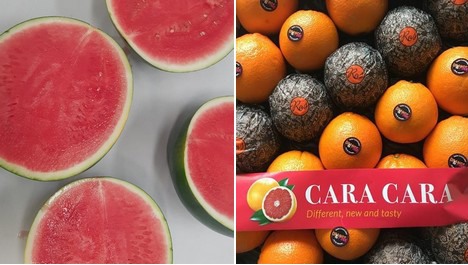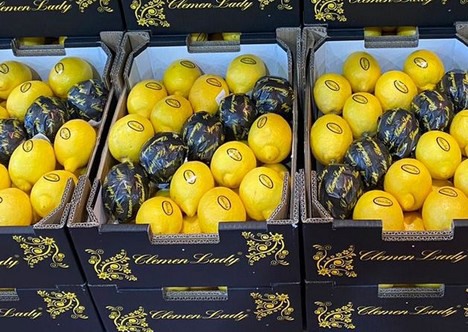A little later than usual, the first watermelons from Senegal were shipped at the end of February. "We have been offering Senegalese watermelons in two varieties for many years. The black striped watermelon is low in seeds and somewhat smaller compared to the seeded Dumara, which weighs up to ten kilograms. Overall, the Senegalese season got off to a very good start, but we are now expecting a slight drop in demand due to the weather and sub-zero temperatures. This is in contrast to the onion market, which is currently going at full speed with imports from Chile, Peru, Mexico and New Zealand," says Sebastian Ringwald, new managing director of the fruit agency of the same name in Lahr, at the foot of the Black Forest.
"We will probably offer watermelons from Senegal until early May," Ringwald predicts. Despite the impact of increased production costs, he said, prices are roughly similar to those of previous years. "They are only slightly above last year's level." This can be contrasted with Spanish iceberg lettuces and other vegetable crops which have also been subject to huge price jumps (due to the huge temperature fluctuations). After the activities in Senegal, the Ringwald fruit agency will continue the campaign in Almeria. Right: the popular Cara Cara orange variety.
After the activities in Senegal, the Ringwald fruit agency will continue the campaign in Almeria. Right: the popular Cara Cara orange variety.
Approaching end of season for Primofiori lemons
The southern German import agency also continues to focus on the procurement and marketing of citrus fruits. Lemons of Spanish origin can be offered throughout the year in this regard, Ringwald said. "The season of the popular Primofiori variety is now drawing to a close and we will be shipping off the last lots in two to three weeks. The temperature, as well as the approaching end of the season, is affecting quality. This means that better lemons will be a bit more expensive and poorer quality ones will be offered at lower prices. After the end of the Primofiori campaign, we will shift seamlessly to the Verna variety. Their yield is smaller than in previous years and prices are much higher compared to Primofiori lemons."
The import and distribution of various varieties of Spanish oranges also continues satisfactorily. Ringwald: "Demand is now declining somewhat as other items, especially seasonal products, are increasingly coming to the fore. However, this can change quickly in the event of another cold spell. We have now been offering the late Navel Powell variety for about two to three weeks, which has been very well received. In my opinion, it is the best orange in terms of aroma. The season for the larger-sized Lane Late orange, on the other hand, is ending."

Successful orange campaign
The first batches of the rose-fleshed Ruby Valencia variety now arrived on April 1; these are typically marketed into August. "Demand for red-fleshed and rose-fleshed varieties, both in the juice and table orange segments, has been exceptionally good this year, certainly as far as the Cara Cara goes. The same was true for the Kirkwood variety. Spanish blood oranges we traded quite long this year. The last Tarocco were loaded in week 11, while Sanguinelli were imported until the end of week 12."
Clementines such as Clemenvilla, Leanri, Nadorcott complete the program. "Also, Spanish Orri did better in some markets in Germany than in previous years. We are trading all clementines, with or without leaf," the fruit importer concludes.
Images: René W. Ringwald GmbH
For more information:
Sebastian Ringwald
René W. Ringwald GmbH
Kaiserstrasse 78
D-77933 Lahr / Schwarzwald
Tel: +49 7821 91540
Fax: +49 7821 915454
info@ringwald-fruchtimport.com
www.ringwald-fruchtimport.com
